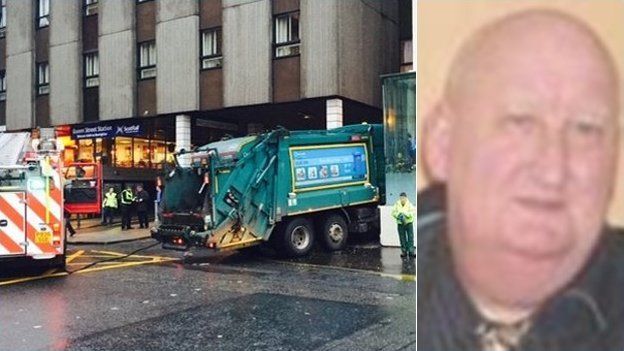Glasgow bin lorry crash: Driver recruitment 'not adequate'
- Published

The inquiry into a bin lorry crash which killed six people in Glasgow has heard of "significant shortcomings" in the council recruitment processes.
Driver Harry Clarke, 58, was unconscious when the vehicle veered out of control on 22 December 2014.
The inquiry has previously heard that Mr Clarke had a history of fainting and dizziness going back 40 years.
Glasgow City Council said he would not have been employed if it had known about his background.
Mr Clarke was taken on by the council in January 2011 to drive a minibus transporting disabled schoolchildren. At the time of his recruitment he had been suspended by his previous employer First Bus over a dispute about his timekeeping while driving buses, but the council was not aware of this.
On the ninth day of the fatal accident inquiry into the crash, Glasgow Sheriff Court also heard that Mr Clarke failed to disclose his medical history on a Bupa form for the council when he was promoted to driving heavier vehicles.
Dorothy Bain QC, representing the bereaved Morton family, questioned Geraldine Ham, a human resources manager at the council, over the authority's recruitment processes.
The driver of the bin lorry that crashed in Glasgow, killing six people, did not disclose his medical history when applying for a previous job
Talking the witness through various employment documents, the lawyer put it to her: "At the stage that Mr Clarke was employed by the council to transport children with special needs, we can see significant shortcomings in the council process for recruitment."
Ms Ham said the local authority tried to ensure that the necessary employment processes were in place.
Ms Bain said the inquiry had seen that where Mr Clarke "doesn't tell the council the truth, the recruitment process was not adequate in order to prevent his employment". The witness agreed.
The QC went on: "For that reason you would agree, I presume, that the recruitment process wasn't adequate?"
Ms Ham responded: "There's room for improvement, yes."
She also agreed that Mr Clarke would not have been given the job if the council had received full disclosure of his medical history.
And Ms Ham said he would have been suspended from driving and removed from duties had his medical history come to light.
'Fantasists and fabulists'
The inquiry heard last week that Mr Clarke had suffered bouts of dizziness in 1976, fainted at work while a lorry driver in 1989 and suffered dizziness for months in 1994.
He is also reported to have fainted while at the wheel of a bus in 2010.
Solicitor advocate Ronald Conway, representing the Tait family, said: "I suspect at the end of this inquiry were are going to find out that Mr Clarke is not a monster, a monster of depravity, he's not a criminal mastermind, but he's a person who has lied repeatedly to find a job and get a job.
"There are lots of Harry Clarkes out there. Lots of fantasists and fabulists who lie to get what they want.
"How does the council deal with job applicants who may not tell the truth?"
He asked if there was anything to prevent the council from asking successful applicants for driving jobs to produce their medical records.
Ms Ham replied: "No, but they would have to give consent."
The HR manager was also cross-examined by Peter Gray QC on behalf of Glasgow City Council.
Mr Gray highlighted the issue of Mr Clarke's "exit form" from First Bus, which had no reference to absence issues or to his suspension, and judged him "suitable for re-engagement".
The inquiry was previously told that Mr Clarke's records showed he had been off work for almost a month after reportedly passing out at the wheel of a bus in April 2010.
Mr Gray put it to Ms Ham that any reference for Mr Clarke based on the First Bus exit form would have been "utterly misleading, inaccurate and untrue".
Ms Ham agreed that an inaccurate form "fundamentally undermines the recruitment process".
The Crown Office has already concluded that there will be no criminal prosecution over the crash, with senior lawyers deeming it a "tragic accident".
State of mind
In a statement on Friday, the prosecution service said Mr Clarke was unconscious when the bin lorry veered out of control in Glasgow city centre "and therefore not in control of his actions".
The Crown Office statement said Mr Clarke did not "have the necessary criminal state of mind required for a criminal prosecution".
It also said that all the relevant evidence was known to the Crown counsel at the time the decision to take no proceedings was made.
Erin McQuade, 18, her grandparents Jack Sweeney, 68, and his 69-year-old wife Lorraine, all from Dumbarton, died in the incident in the city's Queen Street and George Square.
Stephenie Tait, 29, and Jacqueline Morton, 51, both from Glasgow, and Gillian Ewing, 52, from Edinburgh, were also killed when the truck mounted the pavement before crashing into the side of the Millennium Hotel.
A further 15 people were injured.
- Published31 July 2015
- Published30 July 2015
- Published29 July 2015
- Published28 July 2015
- Published27 July 2015
- Published24 July 2015
- Published23 July 2015
- Published25 February 2015